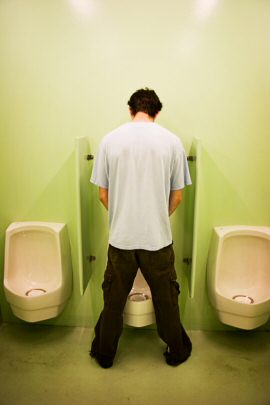Home Page
The latest articles, features and news.


Read About...


|
| | |
|
17 October 2011
Common meds contributing to urinary tract problems
by George Atkinson  Meds such as antidepressants, antihistamines, bronchodilators and diuretics contribute to around 10 percent of lower urinary tract symptoms among men, according to a new study published in the Archives of Internal Medicine.
Meds such as antidepressants, antihistamines, bronchodilators and diuretics contribute to around 10 percent of lower urinary tract symptoms among men, according to a new study published in the Archives of Internal Medicine. This study demonstrates an association between the use of these selected prescription drugs and LUTS among men enrolled in the California Men's Health Study, The 63,579 men in the study, a multiethnic group aged 46 to 69, suffered symptoms such as urinary frequency, weak stream, post-void dribbling, and hesitancy in initiating the stream. Benign prostatic hyperplasia (BPH), commonly known as an enlarged prostate, is considered the predominant cause of lower urinary tract symptoms (LUTS), but the researchers said it was not the only factor. "It is a common misconception that LUTS are solely due to BPH. Interestingly in this study, men without BPH were more likely to be affected by these common medications having lower urinary tract symptoms," said study author Melanie C. Wuerstle, from the Kaiser Permanente Los Angeles Medical Center. While previous studies have shown that several categories of prescription drugs can worsen LUTS, this study assessed the magnitude of the association between specific medications and LUTS. The findings indicated that: - Antidepressants account for 4 percent of LUTS
- Diuretics account for 3 percent
- Bronchodilators account for 2 percent
- Antihistamines account for 1 percent
Medication use also increased with age, especially bronchodilators, anticholinergics, and diuretics. The researchers noted that diuretics, in particular, can cause more frequent urination which could be mistaken for prostate disease.
"If a man has LUTS, his physician will traditionally prescribe an additional medication or suggest surgery. Clinically, the findings from this study suggest that an important step in evaluation of LUTS would be to review the medications the patient is already taking. When necessary, doctors should consider changing the medications which may be causing LUTS before adding new medications," concluded Wuerstle. Related:
Discuss this article in our forum
Get Active, Avoid Urological Problems
Cholesterol drug shrinks enlarged prostates
Enlarged prostate
Source: Kaiser Permanente
|
|

